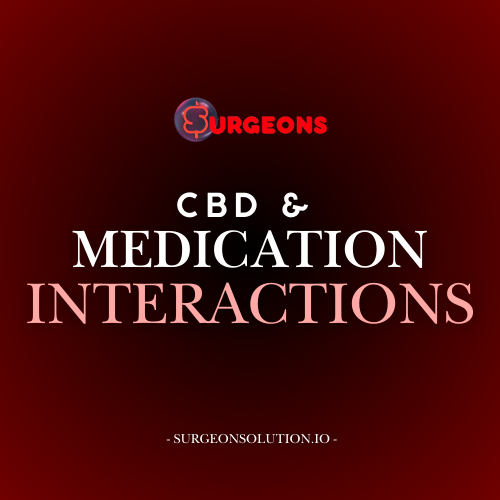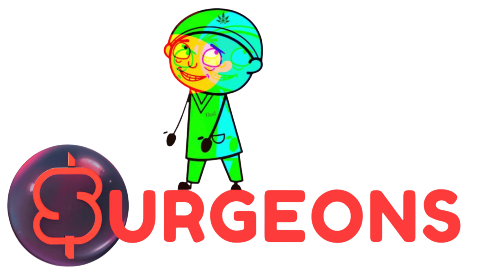Surgeons Online Cannabinoid Academy
CBD and Medication Interactions: What You Need to Know
Introduction
CBD, or cannabidiol, has become a widely used natural remedy for managing stress, pain, and sleep disorders. Despite its numerous benefits, CBD is not without potential risks, especially when taken alongside other medications. Understanding how CBD interacts with medications is crucial for avoiding adverse effects and ensuring its safe and effective use. This guide delves into CBD’s impact on drug metabolism and offers tips for navigating potential interactions responsibly.
How CBD Interacts with Medications
CBD’s interaction with medications primarily occurs through the CYP450 enzyme system in the liver, which is responsible for metabolizing many drugs. When CBD inhibits these enzymes, it can slow down the breakdown of certain medications, leading to higher concentrations in the bloodstream. This can amplify the effects of some drugs or diminish the effectiveness of others, depending on the specific interaction.
For example, CBD’s influence on CYP3A4 and CYP2C19 enzymes can alter the metabolism of blood thinners, antiepileptic drugs, and antidepressants, making it essential to approach CBD use with caution.
Common Medications Affected by CBD
Certain categories of medications are more likely to be affected by CBD interactions. These include:
- Blood Thinners: Medications like warfarin and clopidogrel may increase in potency, raising the risk of bleeding.
- Antidepressants: Selective serotonin reuptake inhibitors (SSRIs) and other mood-regulating medications may experience altered effectiveness.
- Antiepileptic Drugs: CBD can affect levels of drugs like clobazam, potentially enhancing side effects.
- Pain Medications: Opioids and NSAIDs may be impacted by CBD’s modulation of liver enzymes.
These examples highlight the importance of discussing CBD use with healthcare providers, particularly for individuals taking prescription medications.
Signs of Potential CBD-Medication Interactions
Monitoring for signs of CBD-medication interactions is essential when starting or adjusting CBD use. Symptoms to watch for include:
- Increased Side Effects: Dizziness, drowsiness, or nausea may indicate heightened drug potency due to slowed metabolism.
- Reduced Drug Effectiveness: If medications appear less effective, CBD’s impact on absorption or processing could be the cause.
- Unusual Reactions: Any unexpected symptoms should prompt a review of your CBD and medication regimen with a healthcare provider.
How to Use CBD Safely with Medications
To minimize the risk of interactions, follow these safety tips:
- Consult a Healthcare Provider: Discuss CBD use with your doctor or pharmacist, especially if you’re on prescription medications.
- Start with a Low Dose: Begin with a small amount of CBD and monitor your body’s response before increasing the dose.
- Time Your Intake: Separating the timing of CBD and medication doses may reduce interaction risks. Your healthcare provider can guide you on the best approach.
- Choose High-Quality Products: Opt for third-party-tested CBD products to ensure purity and potency.
These strategies help ensure that CBD can be integrated safely into your wellness routine without compromising the effectiveness of other medications.
Conclusion
CBD’s ability to interact with medications underscores the importance of informed use and professional guidance. While CBD offers many therapeutic benefits, understanding its impact on drug metabolism is key to avoiding adverse effects. By consulting healthcare providers, monitoring your response, and choosing high-quality products, you can safely enjoy CBD’s potential alongside your prescribed treatments. Prioritize safety and take an informed approach to CBD use for optimal results.
Introduction
- Overview of CBD’s interaction with the body and its potential to affect liver enzymes.
- Importance of understanding how CBD influences drug metabolism.
What Are Liver Enzymes and Their Role in Drug Metabolism?
- Explanation of liver enzymes like CYP450 and their role in breaking down medications.
- How the liver processes substances, including cannabinoids like CBD.
How CBD Interacts with Liver Enzymes
- Discussion of CBD’s inhibition of the CYP450 enzyme system.
- Explanation of how this interaction can alter drug metabolism.
Implications of Altered Drug Metabolism
- Potential effects on medication effectiveness and safety.
- Examples of medications commonly affected by CBD interactions.
How to Use CBD Safely While Taking Medications
- Tips for managing CBD use alongside prescription drugs.
- Importance of consulting a healthcare provider for personalized guidance.
Conclusion
- Recap of CBD’s effects on liver enzymes and drug metabolism.
- Encourage readers to prioritize safety and informed decision-making.

The Relief Stick
Pair text with an image to focus on a product, collection or blog post. Add details on availability, style or even provide a review.
Contact Us
Pair text with an image to focus on a product, collection or blog post. Add details on availability, style or even provide a review.

Delta 9 THC Seltzerss
Pair text with an image to focus on a product, collection or blog post. Add details on availability, style or even provide a review.
Reviews
Pair text with an image to focus on a product, collection or blog post. Add details on availability, style or even provide a review.



